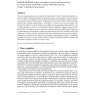Free Online Productivity Tools
i2Speak
i2Symbol
i2OCR
iTex2Img
iWeb2Print
iWeb2Shot
i2Type
iPdf2Split
iPdf2Merge
i2Bopomofo
i2Arabic
i2Style
i2Image
i2PDF
iLatex2Rtf
Sci2ools
141
Voted
LOGCOM
2002
2002
Two Logical Theories of Plan Recognition
We present a logical approach to plan recognition that builds on Kautz's theory of keyhole plan recognition, defined as the problem of inferring descriptions of high-level plans from a set of descriptions of observed, typically low-level, actions. Kautz's approach is based on a formalization of the structural information contained in an abstraction/decomposition hierarchy of plan schemas: the inferred plans are selected by an observer agent from amongst those that can be generated from this hierarchy. In this paper, we present two logics for plan recognition. The first theory, like Kautz's, is monotonic, meaning that all possible plans compatible with the observations are treated as equally plausible by the observer. The second theory is based on rejecting this simplifying assumption, and is nonmonotonic. To develop this theory, we adapt ideas from belief revision and conditional logic to define plan recognition inference as a nonmonotonic consequence operation based on...
Related Content
| Added | 22 Dec 2010 |
| Updated | 22 Dec 2010 |
| Type | Journal |
| Year | 2002 |
| Where | LOGCOM |
| Authors | Wayne Wobcke |
Comments (0)

